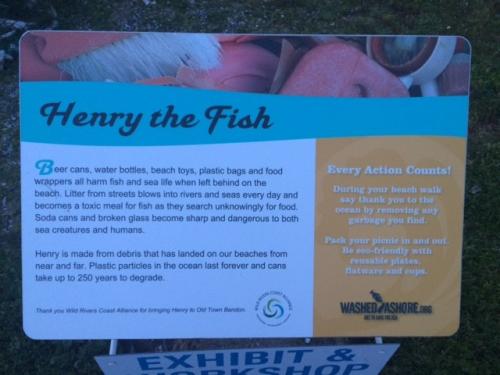What to do with all this plastic? Part 4
Coastal Oregon community displays giant fish made of plastic waste as an environmental message to visitors and residents.

Last year I wrote a series of articles titled, “What to do with all this plastic?” This is the fourth part in that series. I initially thought the series would end with three articles, but while visiting the southern coast of Oregon after attending the Extension Sustainability Summit conference in Portland I encountered the largest plastic fish I’ve ever seen. This isn’t a toy fish or something you buy in a store (yet!), this is marine life that came out of innovation and creativity in order to educate visitors and residents.
It is rare to encounter a giant fish in the center of a community that was constructed entirely of plastic washed ashore. If you ever do you it is fair to assume the community responsible for constructing it is probably passionate about raising awareness of the growing sustainability related problem societies have with plastic entering our ecosystems.
The community of Bandon, Oregon hosts “Henry the Fish” as a symbol of the debris problem coastal communities have entering our ecosystems and decomposing at an alarmingly slow rate. This is a global problem and in article one and two of this series I discuss the magnitude of this waste and where it ends up. Besides plastic washing ashore in coastal communities, which may or may not find a creative use for it like Bandon or other communities have, it enters into massive patches of garbage in the Pacific, also known as the Great Pacific Garbage Patch, and into the diets of marine life.

Communities like Bandon, Oregon or those highlighted in previous articles, such as Paraguay, Uganda, and Michigan, take this issue very serious. An abundance of waste moves leaders to innovate and be creative with the use of this waste penetrating every corner of society. (For additional examples of communities using plastic in a variety of ways see article’s 2 and 3 of this series).
Residents and visitors can do their part by restricting, recycling, and reusing plastics that may be unavoidable. In addition, communities can take measures to conduct awareness campaigns on this topic, organize beach clean-ups, and eliminate plastics and unnecessary waste all together.
Michigan State University Office of Sustainability is actively working towards more sustainable action and living plans. In addition, Michigan State University Extension offers a variety of programs to provide expertise, education and development of communities throughout the state of Michigan. By specialists, educators, program coordinators, instructors and associates all working together, great things can be developed from citizens of Michigan, relevant and life-changing programs will be delivered.
Other articles in this series:



 Print
Print Email
Email


